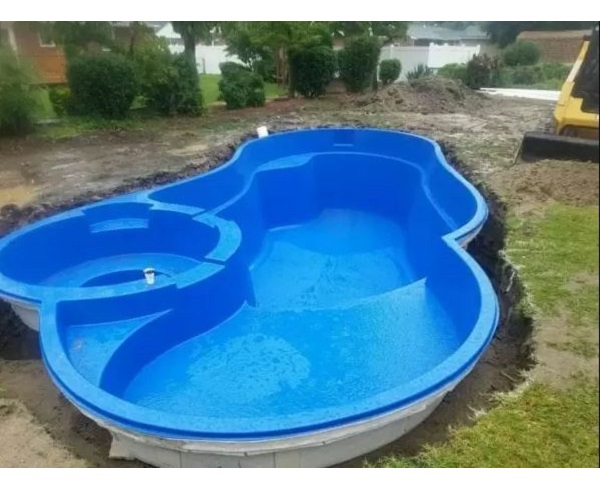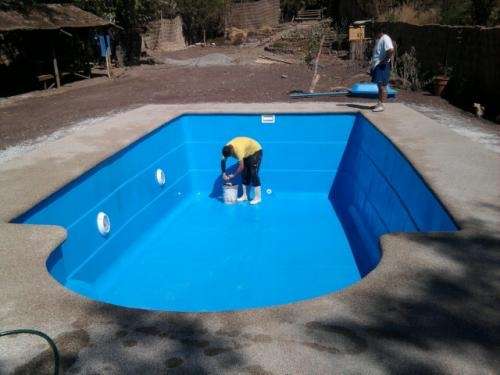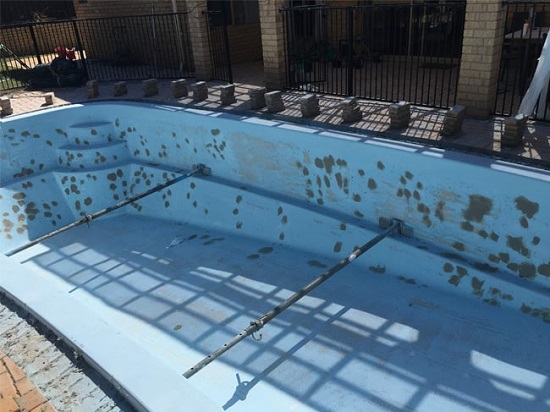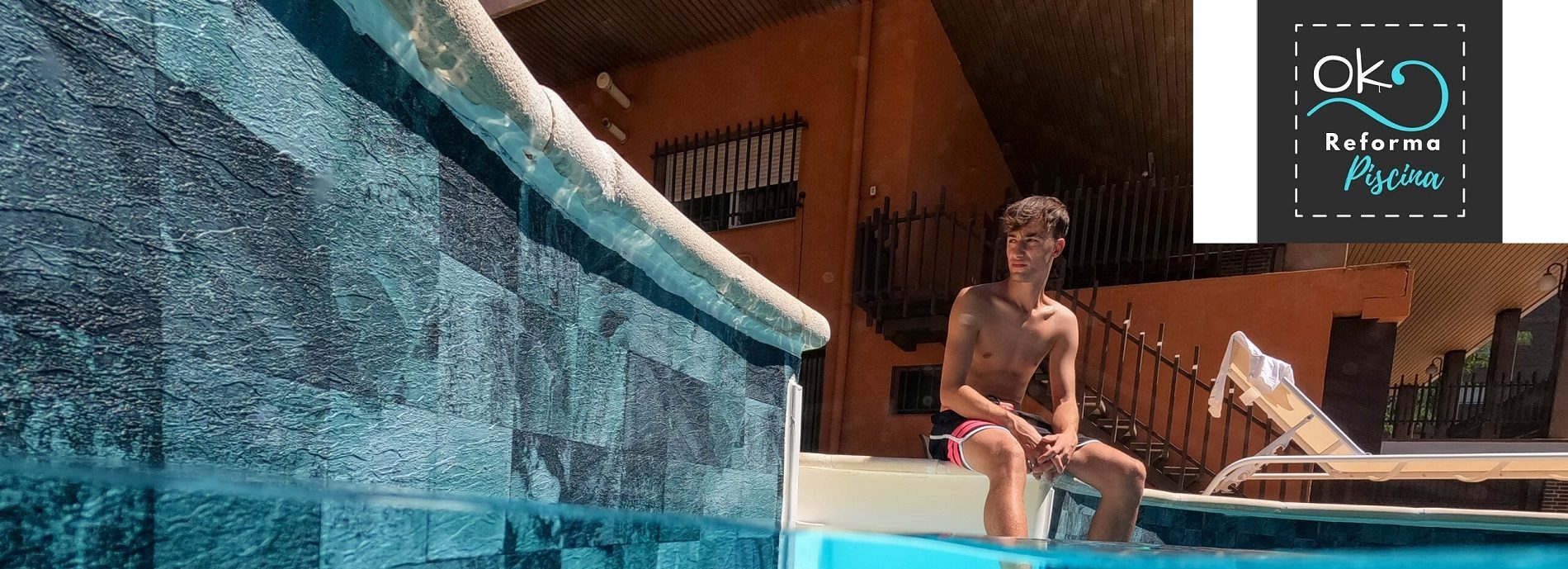
Table of contents of the page
En Ok Pool Reform We present to you the page in which we will discuss: What are fiberglass pools?
What are fiberglass pools?

Fiber pools are a very popular type of prefabricated pools.
Fiber pools are a great option for people who want to enjoy the benefits of having their own pool, but don't want to deal with all the maintenance that comes with traditional concrete pools.
These types of prefabricated pools are made of durable fiberglass materials and are usually installed quickly and easily.
Fiber pools offer a number of advantages compared to other types of pools, such as lower maintenance costs, greater durability and reduced susceptibility to algae growth. Additionally, these pools tend to be more affordable than other options in terms of initial cost and ongoing maintenance.
Although fiber pools also have some disadvantages, such as requiring occasional repairs or repainting, they are generally still one of the best options for homeowners looking to install a new pool on their property.
If you are thinking about installing a pool in your garden, then fiberglass could be the perfect option for you. Thanks to its durability, easy installation, and low maintenance requirements, this type of pool could be a great addition to your home. Why wait? Contact a professional pool installer today to learn more about installing a fiber pool in your backyard.
How are polyester pools made?

How are fiber pools made?
Fiber or polyester pools are made in the factory using custom molds; there are a wide variety of models to choose from and manufacturers.
They are created using molds in the factory, making them easy to reproduce and available in a wide range of styles, designs and colours. The manufacturing process uses several layers of fiberglass-reinforced polyester, known as Gel-Coat, which gives it excellent resistance to ultraviolet rays. These pools are a great option for anyone looking for an affordable luxury pool that will last for years to come.
Fiberglass reinforced plastic, or GRP for short, is a material with excellent properties that make it ideal for the manufacture of swimming pools. Among its most notable characteristics are its high mechanical resistance, its flexibility, its low weight, its impermeability and its surface finish. Thanks to these characteristics, GRP allows the generation of different designs that range from classic straight shapes to more sophisticated curved and circular models. In short, this material offers optimal performance and exquisite aesthetics that adapt to any taste or need.
What is fiberglass?

Fiberglass what is it
It is a polymer made up of groups of very thin glass filaments. This coating material is complemented in pools with a polyester resin, which provides the thickness to the pool.
Fiberglass characteristics
Fiberglass is a flexible, lightweight, durable and easy to maintain material.
Its useful life exceeds 100 years, since the glass with which the material is made takes a long time to decompose given its mineral nature.
What is fiberglass used for?
It is no coincidence that this material is used to reinforce plastics and is often used in boats, cars, bathtubs, surfboards, poles or in multiple construction materials.
Characteristics of fiberglass pools

Fiber pools are prefabricated pools that are made from a mold.
Main properties of fiber pools
- To begin with, Fiberglass pools arrive at your home ready to be installed. Since they are industrially manufactured, there are no complicated installation steps and you won't need any specialized tools or equipment.
- In second place, These pools are made with high quality materials, which makes them resistant to wear, especially compared to other types of such as concrete or vinyl.
- If you are looking for an easy-to-maintain pool, fiberglass pools are also a great option. You can handle the cleaning and maintenance yourself using special chemicals and equipment, which will save you money compared to having to hire professionals to do it every week. Additionally, since these pools do not require much maintenance, they are ideal if you do not have a lot of time or experience when it comes to taking care of your pool.
- Although, they also have the drawback that when they are manufactured industrially in a mold, There may be fewer options when it comes to the size and shape of your pool than with other types of pools such as concrete or vinyl.
In conclusion, if you are looking for an easy-to-install pool that is also durable and easy to maintain, fiber pools could be the perfect option for you. However, be sure to carefully compare your options before making a decision on what type of pool to choose.

The cost of the fiber pool
Approximate price of fiberglass pools
Fiber pools are a great investment as they offer many benefits and can last for many years with proper care.
These pools usually cost between 5000 and 8000 euros, depending on the size and level of customization. Some common features of fiber pools include lights, waterfalls, and ladders, as well as other accessories that can be added based on your preferences.
What advantages do fiber pools have?

Advantages of polyester pools

These are pools that are quick to install and very easy to maintain.
Fiberglass pools have multiple advantages and one of them is that they are a relatively economical solution taking into account that they can be a long-term investment due to their durability.
Polyester or fiberglass pools are cheap pools
Normally economical, prefabricated with molds based on fiberglass and resins.

Its price is so economical since there are as many models as there are molds the manufacturer may have, and its installation is relatively simple and quick.
It is only necessary to have accessible land for the truck or crane that transports the prefabricated pool, make a hole with a base to accommodate the prefabricated pool, and connect the hydraulic pumping and filtration system to it.
Benefits of fiber pools
After weighing the pros and cons, it is clear that they are a viable option for homeowners who want to install a new pool on their property.
Fiber pools have many advantages, such as their flexibility, durability, and ease of maintenance.
- First, mention that the fiber is flexible and durable.
- They are also resistant to atmospheric aggression, which makes them a very reliable material for the construction of swimming pools.
- Additionally, they are easy to install and typically require less time than other types of pool materials.
- Fiberglass pools also require relatively low maintenance costs: there is no need to change the water regularly if the right filtration system and products are used.
- Una de The main advantages they offer is that they are usually more affordable than other options such as pools of steel or concrete. Due to their long life, this type of pool can be considered a good long-term investment.
- Lastly, fiberglass pools are available in a wide variety of shapes and sizes, allowing you to create the perfect pool for your backyard space. Whether you want a simple rectangular pool or an intricate free-form design that mimics nature, fiberglass is a great option.
Disadvantages of fiber pools
Primary disadvantage of polyester or fiber pools

Counterpart of polyester or fiberglass pools: they tend to cause problems
- On the other hand, these are pools that usually cause problems with water leaks, and more commonly osmosis problems, and their repair or rehabilitation is usually complicated and very expensive.
Disadvantages of fiber pools

Below, we explain what are the main points against this type of pools:
If you have an older fiberglass or polyester pool on your property, there is a chance that it may crack over time.
- These cracks are not structural in nature, but affect the overall watertightness of the pool. Therefore, it is important to have your fiberglass or polyester pool checked regularly by a professional pool company who can check for cracks and other potential watertightness issues with your pool.
There are a number of different problems that can occur with the fiber finishing process. A common problem is blistering of fiber puddles, which is the result of osmosis.
- This is because the fibers are not water vapor tight and, over time, the vapor penetrates the interior of the material. When it tries to escape, this can lead to blistering on the surface of the material.
- Fortunately, manufacturers can take steps to avoid these types of problems. For example, they may use an industrial vacuum oven during manufacturing to remove excess moisture and prevent osmosis from occurring. They can also ensure that their products undergo final curing processes before shipping them to customers in order to maximize the water vapor resistance of their products. By following these steps, manufacturers can help ensure that their customers are satisfied with the performance of their material over time.
However, these pools often experience problems with discoloration of the finish, as well as stains and other defects that can be difficult to remedy: Solution to this problem: coating a fiberglass pool with reinforced liner (reinforced sheet)
- For example, black color caused by cobalt bleeding may require repainting the entire pool to correct.
- Additionally, exposure to sunlight for long periods of time can cause the gel coat on the pool surface to fade and discolor.
- These problems are often unavoidable with fiberglass pools, so it is important to fully understand the potential drawbacks before making the purchase.
Bulky Fiber Pool Walls

- Until recently, sand was the most commonly used fill material in fiberglass pools. However, it is not a perfect filler material; Its constant saturation with pool water causes it to become saturated and heavy over time.
- If a bulge occurs on the pool wall due to liquefied sand against the very flexible fiberglass liner, that could spell trouble for your pool.
- Fiberglass pools are made to retain maximum water due to their light weight, so something like a wall bulge would be disastrous.
- Pools with this type of problem should be covered or filled with concrete fill instead of sand, or they will end up cracking along the seams of their liner in no time.




